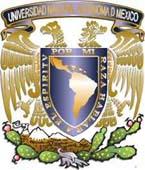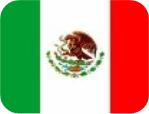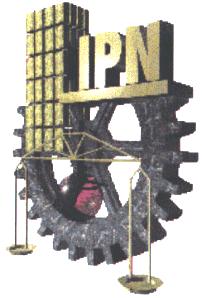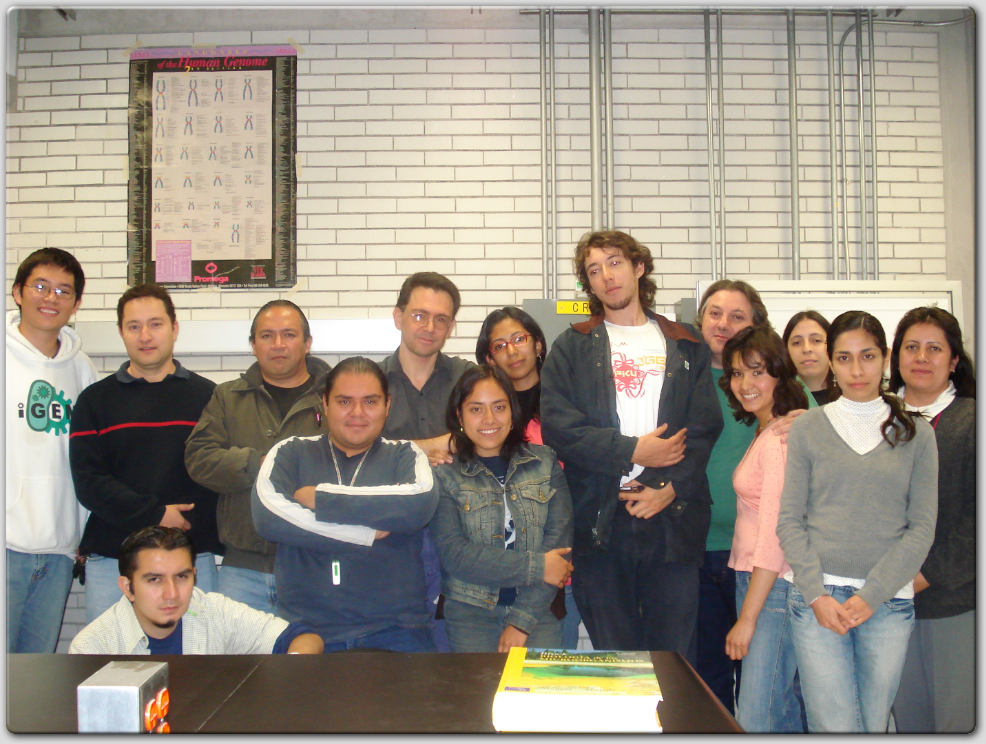Mexico
From 2007.igem.org
m |
|||
| (51 intermediate revisions not shown) | |||
| Line 3: | Line 3: | ||
---- | ---- | ||
| - | == iGEM MEXICO - Mexican Staff == | + | == iGEM MEXICO 2007- Mexican Staff == |
| + | [[Image:IGEM_MEXICO.png]] | ||
| - | ''' | + | '''Students:''' |
| - | + | Alín Patricia Acuña Alonzo (Biology, Faculty of Sciences UNAM, mrniebla2001@yahoo.com.mx) | |
| - | + | Cristian J. Delgado Guzmán (Biology, Faculty of Sciences UNAM, cjdg@ciencias.unam.mx) | |
| - | + | [http://openwetware.org/wiki/User:Federico_Castro_M Federico Castro Monzón] (Biology, Faculty of Sciences UNAM, rakenishu@gmail.com) | |
| - | + | Gabriela Hernández Peréz (Biology, Faculty of Sciences UNAM, gabyhperez@gmail.com) | |
| - | + | [http://openwetware.org/wiki/User:Luis_De_Jesus_Martinez Luis de Jesús Martínez Lomeli] (Mathemathics, Faculty of Sciences UNAM, luis27 AT ciencias DOT unam DOT mx) | |
| - | + | Tadeo Enrique Velazquez Caldelas (Biology, Faculty of Sciences UNAM, tadeus_biol@yahoo.com.mx) | |
| - | + | Yetzi Robles Bucio (Biomedical Sciences, Biomedical Sciences UNAM, yetzi1980@hotmail.com) | |
| - | |||
| + | '''Instructors and institutions:''' | ||
| - | + | Pablo Padilla Longoria (IIMAS, UNAM, pablo@mym.iimas.unam.mx) | |
| - | + | Arturo Becerra Bracho (Faculty of Sciences, UNAM, abb@fciencias.unam.mx) | |
| - | + | Fabiola Ramírez Corona (Faculty of Sciences, UNAM, framirez@miranda.ecologia.unam.mx) | |
| - | + | Rosaura Palma Orozco (ESCOM, IPN, rpalma@math.cinvestav.mx) | |
| + | |||
| + | Elías Samra Hassan (Faculty of Sciences, UNAM, elias@uxmcc2.iimas.unam.mx) | ||
| + | |||
| + | Genaro Juárez Martínez (CEMS, UWE, genaro@cinvestav.mx) | ||
| + | |||
| + | Francisco Hernández Quiroz (Faculty of Sciences, UNAM, fhq@fciencias.unam.mx) | ||
'''Laboratory and Other Space:''' | '''Laboratory and Other Space:''' | ||
| + | |||
| + | Sistematics and Biogeography (Faculty of Sciences UNAM) | ||
| + | |||
| + | Origin of Life (Faculty of Sciences) | ||
| + | |||
| + | Cibernetics (Faculty of Sciences) | ||
Suport from UNAM-PAPIIT Proyect "Formal Languages in Systems Biology" (PAPIIT is the program for suport to research and techonogical inovation of the National University of Mexico). | Suport from UNAM-PAPIIT Proyect "Formal Languages in Systems Biology" (PAPIIT is the program for suport to research and techonogical inovation of the National University of Mexico). | ||
| Line 45: | Line 58: | ||
'''Financial Resources:''' | '''Financial Resources:''' | ||
| - | We have | + | We have RAISED OUR FUNDS TO cover for the registration of the team and individual members, as well as travel and local expenses for the instructors for the May meeting and approximately 60% of the corresponding costs for the students corresponding to the November meeting. |
Some of the instructors are willing to devote part of their grants to support the IPN-UNAM iGEM team. | Some of the instructors are willing to devote part of their grants to support the IPN-UNAM iGEM team. | ||
| Line 53: | Line 66: | ||
| - | ''' | + | '''The Team Members:''' |
| - | + | 14 members: | |
| + | 6 biology students | ||
| - | + | 1 biomedical student | |
| - | + | 1 mathematics student | |
| - | + | ==Introduction== | |
| - | + | One of the most important problems in developmental biology is the understanding of how structures emerge in living systems. Several mechanisms have been proposed, depending on the observed patterns. The so called Turing patterns are based on the interaction of two effects: diffusion of some chemicals, called morphogenes, and the chemical interaction between them. It has been highly controversial whether some patterns observed in several organisms are of this type. In particular, although some systems have been identified to be of activator-inhibitor type (the most popular Turing system proposed by Gierer and Meindhart), it is still questioned if pattern formation and more generally, the appearance of functional structures can be understood by means of Turing patterns or more broadly, reaction-diffusion mechanims. | |
| + | One of the main goals of our project is to test different pattern formation mechanisms, not only Turing patterns, but also oscillatory and time varying structures. We propose that if the appropriate genetic construction is implanted in a colony of bacteria, the reaction-diffusion mechanism can be replaced by a genetic control system. This fact is first illustrated with the, by now classical, repressilator. Then we give two constructions of our own. The first is a modification of Elowitz system, which inclueded bot positive and inhibitory interactions. The positive ones are in fact dependent on quorum diffusible signals. | ||
| - | + | In order to model these systems, we use both a stochastic pi calculus and differential equations approach. For this construction experiments are yet to be performed. | |
| + | For the other construction, we have two plasmids embedded in two different colonies. Each plasmid allows the bacterium to fluoresce red or green respectively. | ||
| + | Our hypothesis is that competition between these two colonies once they are allowed to | ||
| + | interact might function as a Turing system. For this we already have experimental results, and preliminary models. | ||
| + | |||
| + | ==Experiment involving collonies with RFP and GFP interactions== | ||
| + | Results [[Media:Resultsuntil26Oct2007.pdf]] | ||
| + | Log1 (In Spanish) [[Media:Log1.pdf]] | ||
| + | Log2 (In Spanish) [[Media:Log2.pdf]] | ||
| + | |||
| + | ==iGEM Mexico Construction modeled in Stochastic Pi-Calculus== | ||
| + | Presentation "iGEM México Simulation on Stochastic π-Calculus" [[Media:IGEM_México_Simulation_on_Stochastic__Pi-Calculus_pdf.pdf]] | ||
| + | |||
| + | ==Previous work== | ||
| + | Presentation "Teach the teachers" iGEM-Mexico 2007 [[Media:IGEM-MEX07.pdf]]. | ||
| + | |||
| + | ==Bulletin iGEM Mexico No. 2 (edited in spanish)== | ||
| + | Bulletin iGEM Mexico No. 2 [[Media:Bulletin-2.pdf]]. | ||
| + | |||
| + | ==Temas de investigación en Autómata Celular== | ||
| + | Los temas de investigación propuestos en Autómata Celular son detallados en el siguiente URL. Aunque hay mas temas y estos no estan desglosados, cualquier duda o comentario solo escribanme. [[Media:TemasGenaro.pdf]]. | ||
| + | |||
| + | -[[User:Genarojm|Genaro]] | ||
Latest revision as of 21:20, 24 November 2008
 [http://www.unam.mx]
[http://www.unam.mx]  [http://es.wikipedia.org/wiki/M%C3%A9xico]
[http://es.wikipedia.org/wiki/M%C3%A9xico]  [http://www.ipn.mx]
[http://www.ipn.mx]Contents |
iGEM MEXICO 2007- Mexican Staff
Students:
Alín Patricia Acuña Alonzo (Biology, Faculty of Sciences UNAM, mrniebla2001@yahoo.com.mx)
Cristian J. Delgado Guzmán (Biology, Faculty of Sciences UNAM, cjdg@ciencias.unam.mx)
[http://openwetware.org/wiki/User:Federico_Castro_M Federico Castro Monzón] (Biology, Faculty of Sciences UNAM, rakenishu@gmail.com)
Gabriela Hernández Peréz (Biology, Faculty of Sciences UNAM, gabyhperez@gmail.com)
[http://openwetware.org/wiki/User:Luis_De_Jesus_Martinez Luis de Jesús Martínez Lomeli] (Mathemathics, Faculty of Sciences UNAM, luis27 AT ciencias DOT unam DOT mx)
Tadeo Enrique Velazquez Caldelas (Biology, Faculty of Sciences UNAM, tadeus_biol@yahoo.com.mx)
Yetzi Robles Bucio (Biomedical Sciences, Biomedical Sciences UNAM, yetzi1980@hotmail.com)
Instructors and institutions:
Pablo Padilla Longoria (IIMAS, UNAM, pablo@mym.iimas.unam.mx)
Arturo Becerra Bracho (Faculty of Sciences, UNAM, abb@fciencias.unam.mx)
Fabiola Ramírez Corona (Faculty of Sciences, UNAM, framirez@miranda.ecologia.unam.mx)
Rosaura Palma Orozco (ESCOM, IPN, rpalma@math.cinvestav.mx)
Elías Samra Hassan (Faculty of Sciences, UNAM, elias@uxmcc2.iimas.unam.mx)
Genaro Juárez Martínez (CEMS, UWE, genaro@cinvestav.mx)
Francisco Hernández Quiroz (Faculty of Sciences, UNAM, fhq@fciencias.unam.mx)
Laboratory and Other Space:
Sistematics and Biogeography (Faculty of Sciences UNAM)
Origin of Life (Faculty of Sciences)
Cibernetics (Faculty of Sciences)
Suport from UNAM-PAPIIT Proyect "Formal Languages in Systems Biology" (PAPIIT is the program for suport to research and techonogical inovation of the National University of Mexico).
Computing lab facilities from the School of Science and the Applied Mathematics Institute at UNAM, including standard software and internet connections, as well as several seminar and classrooms for meetings.
We have a lab space with meeting space, 1 notebook, 3 Power Mac,5 PC's, 1 Dell Server, 3 Thermocyclers,Microcentrifuges, complete horizontal and vertical Electrophoresis systems, Automatic Sequencer, Hibridization oven, Electrophorator, Micropipettes, Speedvac Eppendorf, UV Crosslinker, Spectrophotometer, pHmeter, Liophylizer, complete photodocumentation systems.
Financial Resources:
We have RAISED OUR FUNDS TO cover for the registration of the team and individual members, as well as travel and local expenses for the instructors for the May meeting and approximately 60% of the corresponding costs for the students corresponding to the November meeting.
Some of the instructors are willing to devote part of their grants to support the IPN-UNAM iGEM team.
We have a grant from a current project which will allow us to cover the initial expenses. In the meantime, we have submitted another grant proposal specifically for iGEM. This proposal is likely to be accepted within the next three months.
The Team Members:
14 members:
6 biology students
1 biomedical student
1 mathematics student
Introduction
One of the most important problems in developmental biology is the understanding of how structures emerge in living systems. Several mechanisms have been proposed, depending on the observed patterns. The so called Turing patterns are based on the interaction of two effects: diffusion of some chemicals, called morphogenes, and the chemical interaction between them. It has been highly controversial whether some patterns observed in several organisms are of this type. In particular, although some systems have been identified to be of activator-inhibitor type (the most popular Turing system proposed by Gierer and Meindhart), it is still questioned if pattern formation and more generally, the appearance of functional structures can be understood by means of Turing patterns or more broadly, reaction-diffusion mechanims. One of the main goals of our project is to test different pattern formation mechanisms, not only Turing patterns, but also oscillatory and time varying structures. We propose that if the appropriate genetic construction is implanted in a colony of bacteria, the reaction-diffusion mechanism can be replaced by a genetic control system. This fact is first illustrated with the, by now classical, repressilator. Then we give two constructions of our own. The first is a modification of Elowitz system, which inclueded bot positive and inhibitory interactions. The positive ones are in fact dependent on quorum diffusible signals.
In order to model these systems, we use both a stochastic pi calculus and differential equations approach. For this construction experiments are yet to be performed. For the other construction, we have two plasmids embedded in two different colonies. Each plasmid allows the bacterium to fluoresce red or green respectively. Our hypothesis is that competition between these two colonies once they are allowed to interact might function as a Turing system. For this we already have experimental results, and preliminary models.
Experiment involving collonies with RFP and GFP interactions
Results Media:Resultsuntil26Oct2007.pdf Log1 (In Spanish) Media:Log1.pdf Log2 (In Spanish) Media:Log2.pdf
iGEM Mexico Construction modeled in Stochastic Pi-Calculus
Presentation "iGEM México Simulation on Stochastic π-Calculus" Media:IGEM_México_Simulation_on_Stochastic__Pi-Calculus_pdf.pdf
Previous work
Presentation "Teach the teachers" iGEM-Mexico 2007 Media:IGEM-MEX07.pdf.
Bulletin iGEM Mexico No. 2 (edited in spanish)
Bulletin iGEM Mexico No. 2 Media:Bulletin-2.pdf.
Temas de investigación en Autómata Celular
Los temas de investigación propuestos en Autómata Celular son detallados en el siguiente URL. Aunque hay mas temas y estos no estan desglosados, cualquier duda o comentario solo escribanme. Media:TemasGenaro.pdf.
